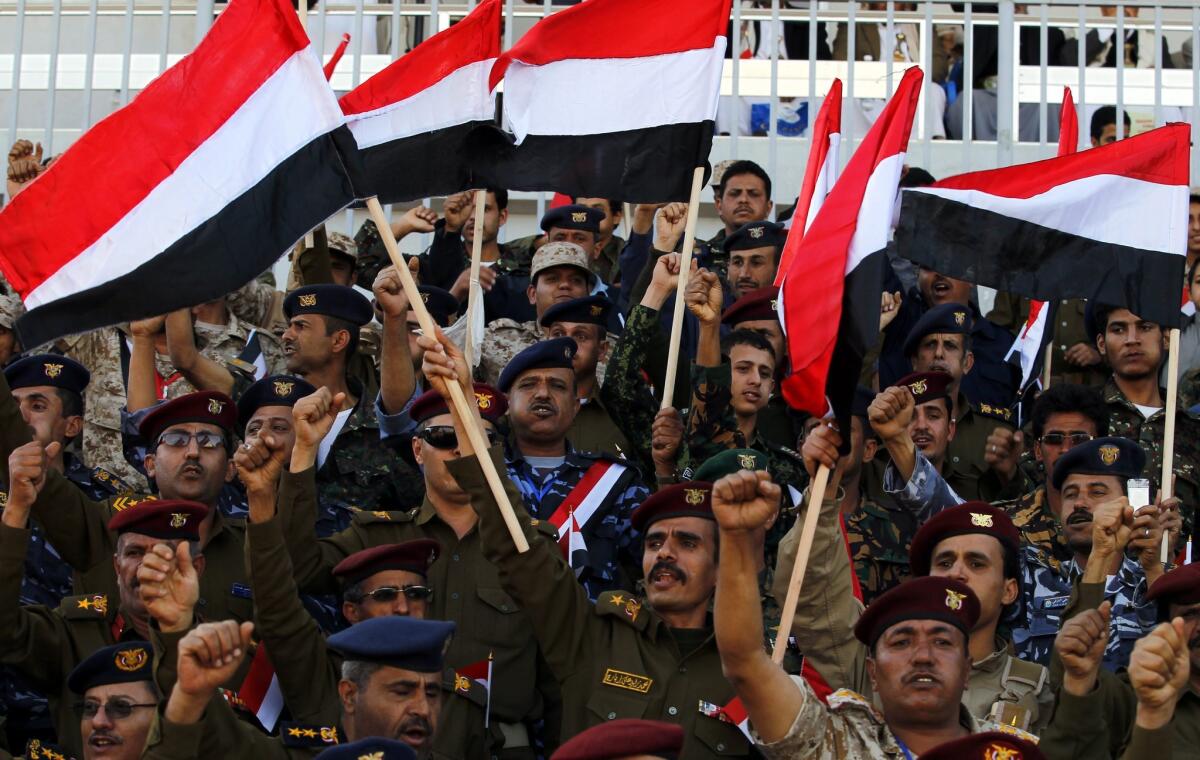U.S. Embassy in Yemen closing because of security threats

- Share via
Reporting from Washington — The U.S. Embassy in Yemen is closing because of mounting security threats, State Department officials said Tuesday, raising questions about the future of the high-priority U.S. counter-terrorism campaign in the unstable Arab nation.
The embassy in Sana, the capital, will shut its doors indefinitely after the expected departure of Ambassador Matt Tueller on Wednesday, officials said. The mission has been reducing its staff and scaling back operations for several months.
Yemen will be the third Middle Eastern country, along with Libya and Syria, from which U.S. diplomats have withdrawn since 2011 because of political strife.
Yemen has been edging toward anarchy since last fall, when Iranian-backed Shiite Muslim rebels known as Houthis swept in from their homeland in the country’s northwest corner to seize Sana. They placed the U.S.-backed president, Abdu Rabu Mansour Hadi, under house arrest Jan. 22, leading him and his Cabinet to tender their resignations.
U.S. officials have tried to continue the counter-terrorism campaign despite the loss of crucial support from Hadi’s government.
After a two-month pause, they resumed drone strikes last month on Al Qaeda in the Arabian Peninsula, which U.S. officials consider the terrorist network’s most dangerous affiliate.
Because the drones are flown from bases outside Yemen, the CIA and Pentagon should be able to strike AQAP without an operating embassy, analysts say.
A Pentagon spokesman, Rear Adm. John Kirby, said special operations forces will remain in Yemen and will conduct counter-terrorism training with Yemeni security forces. But he acknowledged that the recent turmoil has been a setback for U.S. operations in the country.
“There’s no question that as a result of the political instability in Yemen our counter-terrorism capabilities have been affected,” he said. “Obviously, doing counter-terrorism in a foreign country is always more effective when you have a reliable partner. Right now that partner ... is in flux.”
Kirby said U.S. forces would help evacuate embassy personnel if necessary. Two amphibious ships, the Fort McHenry and the Iwo Jima, are in the Red Sea, positioned to assist.
Security has steadily worsened in the capital. On Jan. 17, a U.S. Embassy armored vehicle was struck by gunfire at a Houthi roadblock, though the Americans inside were not injured.
In addition to concern about the diplomats’ safety, keeping the embassy open carried a special political sensitivity because of the controversy that erupted after armed assailants stormed a U.S. diplomatic compound in Benghazi, Libya, in September 2012. The terrorist attack killed Ambassador J. Christopher Stevens and three other Americans.
Jen Psaki, a State Department spokeswoman, described the situation Tuesday in Sana as “volatile.” But she said U.S. officials would continue to go after AQAP.
“We will continue to take action to disrupt continuing imminent threats to the United States and our citizens,” she said. “We will continue to apply pressure and work through any — every channel we have access to.”
The Yemeni political struggle is multi-sided. The players include the Houthis, Sunni tribes, AQAP, separatist militants in the south, and the country’s longtime president, Ali Abdullah Saleh, who was ousted in 2012.
Though it involves the sectarian clash of Shiite and Sunni Muslims, it is in many ways a local power struggle.
A United Nations envoy is trying to resolve the political deadlock through mediation. But the talks are making little progress.
Houthi leaders want their interests protected, but don’t want responsibility for governing an impoverished country with failing public services. They are pressing a group of Yemeni parties to form a new governing coalition.
But the other parties, resentful of Houthi pressure, have been balking at joining the new coalition. Two parties walked out of the talks Tuesday.
Follow @richtpau and @wjhenn on Twitter
More to Read
Sign up for Essential California
The most important California stories and recommendations in your inbox every morning.
You may occasionally receive promotional content from the Los Angeles Times.














